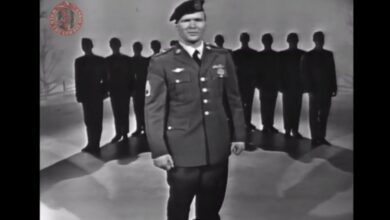Freddy wrote this song in 1956, and it soared to fame in the 70s – great job, Freddy!
Freddy Fender, originally named Baldemar Garza Huerta, was a legendary musician who made a significant impact by blending Tejano music with country and rock influences. He was born on June 4, 1937, in San Benito, Texas, to Mexican immigrant parents. This rich cultural heritage deeply influenced his upbringing, allowing him to absorb a mix of Mexican and American musical traditions. Fender’s love for music bloomed during his youth, as he often played the guitar and penned songs while navigating the challenges of growing up.
Fender’s early career reflected the obstacles faced by many artists. His breakthrough single, “Wasted Days and Wasted Nights,” released in 1958, was quickly followed by a personal setback: Fender was convicted of marijuana possession, resulting in a prison sentence that interrupted his promising career. Rather than letting this derail him, he viewed the experience as an opportunity for growth, ultimately shaping both his artistry and dedication to music.
The transforming music scene of the early 1970s, particularly the rising Chicano music movement, ushered in a new opportunity for Fender. He skillfully tapped into the cultural shift that welcomed Mexican American artists, crafting music that resonated with a wide audience. In 1974, he gained significant recognition with “Before the Next Teardrop Falls,” a chart-topping hit that showcased his unique talent for weaving together English and Spanish lyrics. This song became a cultural touchstone, touching on themes of love and loneliness that appealed to listeners from various backgrounds.
Fender’s revamped version of “Wasted Days and Wasted Nights” in 1975 marked his strong comeback in the music industry. By integrating country music influences with his Tejano roots, he produced a rendition that achieved great success, ascending the Billboard Country charts and making a notable impact on the Hot 100 as well. This reinterpretation not only revitalized a previously overlooked song but also highlighted Fender’s artistic evolution and his ability to seamlessly blend different musical styles.
Throughout the late 1970s and into the 1980s, Fender released numerous albums and hits that celebrated his eclectic musical heritage. His work often reflected a rich blend of traditional Mexican melodies, the narrative style of country music, and the emotional resonance of rock. By addressing themes of love, cultural identity, and heartache, Fender struck a chord with a vast audience, making his music a staple across jukeboxes in the United States and Mexico.
Beyond his commercial achievements, Freddy Fender is celebrated as a trailblazer for Mexican Americans in the music industry. He served as a source of inspiration for aspiring musicians, paving the way for future artists by showcasing the beauty and viability of cultural musical fusion. His impact reached beyond just hit songs; he became a strong advocate for cultural representation, dedicating much of his career to celebrating his heritage through his artistry.
Fender received various accolades acknowledging his contributions to music, including his induction into the Texas Country Music Hall of Fame in 2002. These recognitions reflected not only his artistic achievements but also the deep appreciation and respect he earned from fans and fellow musicians. His performances were known for their emotional depth, and he often expressed gratitude for the unwavering support of his audience, reinforcing the strong connection he shared with them.
Despite facing life’s ups and downs, Fender maintained a strong bond with his roots and his fans until his death on October 14, 2006. His legacy remains a source of inspiration for contemporary artists, particularly within Tejano and country music genres. The enduring appeal of songs like “Wasted Days and Wasted Nights” and “Before the Next Teardrop Falls” continues to resonate with both longtime fans and new generations discovering his music.
Fender’s life illustrates the transformative power of music as a form of cultural expression and personal healing. His ability to draw from his life experiences allowed him to connect with fans on a deeper emotional level, demonstrating how music can bridge cultural and linguistic divides. As interest in Tejano music grows, many modern artists reflect Fender’s influence through their exploration of similar themes and sounds.
In summary, Freddy Fender’s legacy is one of perseverance and triumph, characterized by a strong commitment to cultural identity and musical innovation. His journey underscores the importance of music in fostering societal connections, exploring identity, and facilitating personal expression. Fender’s artistic contributions have left a lasting impact on the music industry and continue to inspire future generations, ensuring that his achievements will be celebrated for years to come.





